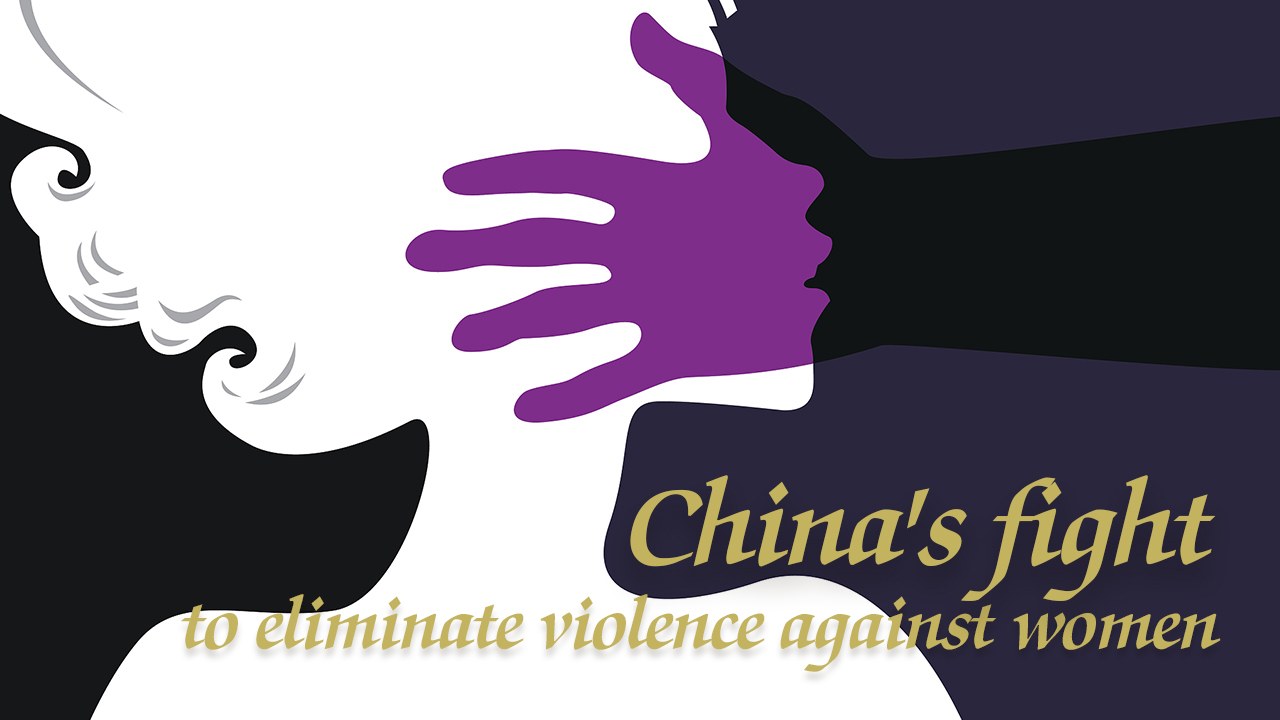
Culture
15:47, 25-Nov-2018
China's fight to eliminate violence against women
Updated
14:42, 28-Nov-2018
By Ye Qing

The United Nations (UN) General Assembly defines "violence against women and girls" (VAWG) as one of the most widespread, persistent and devastating human rights violations in our world today. The international body designated November 25 as "International Day for the Elimination of Violence Against Women," but the words "women" and "violence" unexpectedly came to the forefront in China once again earlier this year.
Chinese actor Jiang Jinfu was embroiled in a domestic violence scandal after his Japanese girlfriend, model Haruka Nakaura, posted photos on Instagram of her bruised visage, alleging that his physical abuse had caused her to miscarry.

The left is Jiang Jinfu's apology on his Weibo page, while the right is Haruka Nakaura's post on Instagram, which has now been deleted. /Screenshot via Weibo, Instagram
The left is Jiang Jinfu's apology on his Weibo page, while the right is Haruka Nakaura's post on Instagram, which has now been deleted. /Screenshot via Weibo, Instagram
Chinese netizens have differing opinions on the matter, with some accusing Jiang of violence while saying that Nakaura misbehaved. The topic "whether being abused by your boyfriend counts as domestic violence" was even one of the top searches on the social media platform Weibo.
Violence against women, of course, is not limited to celebrities. According to the United Nations, one-third of women worldwide have experienced physical or sexual abuse, with the majority of the perpetrators having a close relationship with them.

The topic "whether being abused by your boyfriend counts as domestic violence" was ranked seventh on real-time most searched topics on Weibo. /Screenshot via Weibo
The topic "whether being abused by your boyfriend counts as domestic violence" was ranked seventh on real-time most searched topics on Weibo. /Screenshot via Weibo
According to a special report on divorce disputes by the China Justice Big Data Service Platform, in the past two years, 91.43 percent of the cases involving domestic violence in divorce disputes nationwide were caused by domestic violence against women by men.
Among those cases, forms of violence were primarily manifested through beatings and insults.
Silence is not the worst
In reality, most victims of domestic violence do not call for help. According to the United Nations, less than 40 percent of women who suffer violence in most countries have sought help, and less than 10 percent have called the police.
In China, victims do not call the police until they have experienced an average of 35 domestic violence incidents, according to the Beijing News.

VCG Photo
VCG Photo
Professor Sun Xiaomei, a researcher of women's and children's rights, once mentioned in an interview that every woman in the survey had been abused many times by their husband, but they still chose to make up with their husband.
"They think it's normal to be treated like this for a lifetime," said Sun.
Though the survey was conducted in 1993, more than 20 years later, many still don't realize that, for whatever reason, domestic violence itself is wrong, regardless of how sincerely the perpetrator confesses to the mistakes, or whether the victim misbehaves or not, said the Beijing News.
Violence against women goes far beyond that
The UN believes that in addition to physical abuse such as beatings, intimidation and mental abuse also belong to domestic violence.
Also, violence against women is not limited to the family. According to the "Third Survey on Chinese Women's Social Status," the social and cultural environment for women's development needs to be improved.

On March 1, 2016, the six-chapter "Anti-Domestic Violence Law of the People's Republic of China" was officially implemented. /VCG Photo
On March 1, 2016, the six-chapter "Anti-Domestic Violence Law of the People's Republic of China" was officially implemented. /VCG Photo
Things are slowly improving in China
Twenty-three years ago, the "Outline for the Development of Chinese Women (1995-2000)" issued by China's State Council explicitly used the concept of "domestic violence" for the first time.
Six years later, China's first TV series about domestic violence called "Don't Respond to Strangers" aired, educating many Chinese about the concept.
However, many women have had negative thoughts when facing domestic violence due to shortcomings in local regulations and misunderstandings of the concept.

VCG Photo
VCG Photo
China has gradually improved anti-violence and relevant laws, under the efforts of different organizations.
On March 1, 2016, the six-chapter "Anti-Domestic Violence Law of the People's Republic of China" was officially implemented, more than two decades after the UN issued its "Declaration on the Elimination of Violence Against Women."
Not all victims of domestic violence resort to divorce. Many choose silence, tolerance, and hiding, but the "Anti-Domestic Violence Law" stipulates relative constraint and rules of protection, such as implementing a "Personal Safety Protective Order."
"Anti-domestic violence is the voice of the country," said Liu Qun, who has participated in the legislative discussion of the "Anti-Domestic Violence Law of China" many times.
(Top image made by Jia Jieqiong)

SITEMAP
Copyright © 2018 CGTN. Beijing ICP prepared NO.16065310-3
Copyright © 2018 CGTN. Beijing ICP prepared NO.16065310-3